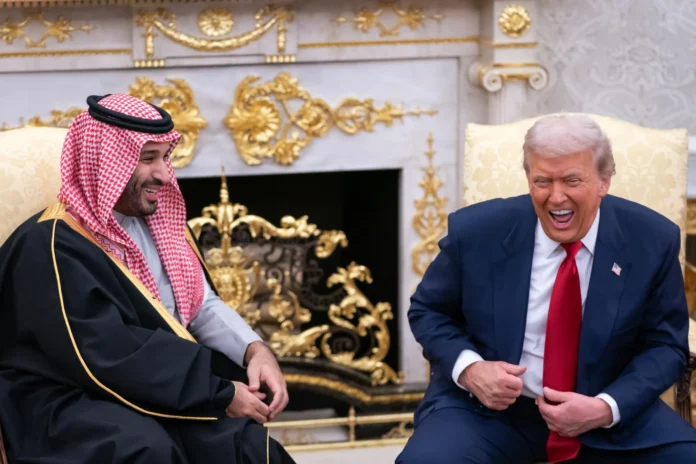President Donald Trump announced a new security pact with Saudi Arabia this week, and he described it as a strategic deal that could reshape defense cooperation across the Middle East. The introduction of this strategic deal also signaled a major diplomatic shift during a tense regional moment.
Trump revealed the agreement during Crown Prince Mohammed bin Salman’s visit to Washington. He highlighted the planned sale of F-35 fighters to Saudi Arabia and confirmed the kingdom’s new major non-NATO ally status. He also said Saudi Arabia intends to raise its U.S. investments to one trillion dollars.
During the meeting, Trump stressed deeper coordination on security and technology. He pointed to new U.S. tank sales and broader access for American defense firms inside Saudi Arabia. He also noted fresh cooperation plans tied to nuclear energy, artificial intelligence, and semiconductor development. However, the administration did not provide key details, which quickly led to questions from analysts.
Many experts said the deal needs more clarity. They want specific terms, timelines, and obligations. They also want to know how the agreement affects Israel’s long-standing security advantage. U.S. law requires Washington to maintain Israel’s qualitative military edge over other regional partners. Because of that rule, lawmakers demand clear explanations on how the F-35 sale fits within those limits.
Israeli officials expressed confidence about the policy. They said Israel’s qualitative edge remains secure and well understood. They also encouraged continued dialogue to protect shared interests.
Analysts compared the new pact to recent U.S. agreements with Qatar. Last year, the administration granted Qatar expanded security guarantees. Some experts believe Saudi Arabia now wants similar protections. However, that request may require progress on normalization with Israel. The crown prince tied any normalization effort to a two-state framework for Palestinians, which the administration does not support.
Several members of Congress have also raised concerns. They questioned Saudi Arabia’s human rights record and asked for a strong justification for the weapons sales. They also warned that rushed decisions could create new regional tensions.
Even so, other analysts said the agreement underscores Washington’s deep interest in Saudi Arabia as a strategic partner. They argued that the pact strengthens U.S. influence and helps counter rival powers seeking leverage in the Gulf region. They also said the agreement gives U.S. defense firms major commercial opportunities.
Moving forward, many details remain unresolved. Officials have not confirmed the number of F-35 jets or delivery timelines. They also have not finalized cooperation programs beyond the initial outlines. However, both governments signaled a strong interest in continued negotiations and future announcements.
As talks progress, regional leaders and defense companies will watch closely. They want clear information, predictable timelines, and stable policy commitments. For now, the agreement marks a significant shift in U.S.-Saudi relations and reinforces the strategic deal at the center of Trump’s message.
For more updates, visit DC Brief.


